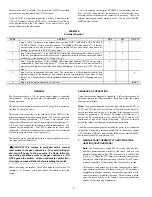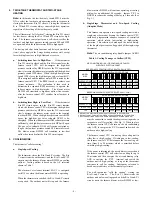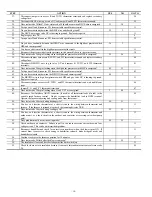
- 3 -
The furnace will start up in either low- or high-heat. If the
furnace starts up in low-heat, the control CPU determines the
low-heat on-time (from 0 to 16 minutes) which is permitted
before switching to high-heat.
If the power is interrupted, the stored history is erased and the
control CPU will select low-heat for up to 16 minutes and then
switch to high-heat, as long as the thermostat continues to call
for heat. Subsequent selection is based on stored history of the
thermostat cycle times.
The wall thermostat "calls for heat", closing the R to W circuit.
The furnace control performs a self-check, verifies the low-heat
and high-heat pressure switch contacts LPS and HPS are open.
a. Inducer Prepurge Period -
The furnace control CPU
turns on inducer motor IDM and slowly increases the
inducer motor speed. When the low-heat pressure switch
LPS closes, inducer motor RPM is noted by the furnace
control CPU, and a 25-second prepurge period begins. The
RPM is used to evaluate vent system resistance. This
evaluation is then used to determine the required RPM
necessary to operate the inducer motor during the low-heat
prepurge period and low-heat mode.
Note:
The heat cycle can start in either high- or low-heat.
If a high-heat cycle is initiated, the furnace control CPU
will de-energize the high-heat pressure switch relay HPSR
to close the NC contact and continues to increase the
inducer motor speed after the low-heat pressure switch LPS
closes. When the high-heat pressure switch closes, inducer
motor RPM is noted by the furnace control CPU, and a 25-
second prepurge period begins. The RPM is used to
evaluate vent system resistance. This evaluation is then
used to determine the required RPM necessary to operate
the inducer motor in high-heat mode.
b. Igniter
Warm-Up
- At the end of the prepurge period, the
Hot-Surface Igniter HSI is energized for a 17-second igniter
warm-up period.
c. Trial-For-Ignition
Sequence
- When the igniter warm-up
period is completed the main gas valve relay contact GVR
closes to energize the gas valve solenoid GV-M. The gas
valve solenoid GV-M permits gas flow to the burners where
it is ignited. After 5 seconds, the igniter HSI is de-
energized and a 2-second Flame-Proving period begins.
If the furnace control CPU selects high-heat operation, the
high-heat gas valve solenoid GV-HI is also energized.
d. Flame-Proving
- When the burner flame is proved at the
flame-proving sensor electrode FSE, the furnace control
CPU begins the blower-ON delay period and continues to
hold the gas valve GV-M open. If the burner flame is not
proved within two seconds, the control CPU will close the
gas valve GV-M, and the control CPU will repeat the
ignition sequence for up to three more Trials-For-Ignition
before going to Ignition-Lockout.
Lockout will be reset
automatically after three hours, by momentarily interrupting
115 vac power to the furnace, or by interrupting 24 vac
power at SEC1 or SEC2 to the furnace control CPU (not at
W/W1, G, R, etc.).
If flame is proved when flame should not be present, the
furnace control CPU will lock out of Gas-Heating mode
and operate the inducer motor IDM at full speed until
flame is no longer proved.
e. Inducer Speed Change
– If the cycle starts in low-heat, the
furnace control CPU reduces the inducer speed slightly
after flame sense. If the cycle starts in high-heat, the
furnace control CPU increases the inducer speed 15
seconds after flame sense. The reduction in speed in low-
heat is to optimize combustion for maximum efficiency.
f. Blower-On
delay
– If the burner flame is proven the
blower-ON delay for low-heat and high-heat are as follows:
Low-heat:
355MAV and 355AAV
– 60 seconds after the gas valve
GV-M is opened the blower motor BLWM is turned ON at
low-heat airflow.
355BAV
– 30 seconds after the gas valve GV-M is opened
the blower motor BLWM is turned ON at low-heat
airflow.
High-heat
– 35 seconds after the gas valve GV-M is
opened the BLWM is turned ON at high-heat airflow.
Simultaneously, the humidifier terminal HUM and
electronic air cleaner terminal EAC-1 are energized and
remain energized throughout the heating cycle.
g. Switching from Low- to High-Heat
- If the furnace
control CPU switches from low-heat to high-heat, the
furnace control CPU will de-energize the high-heat
pressure switch relay HPSR to close the NC contact and
slowly increase the inducer motor speed until the high-heat
pressure switch HPS closes. When the high-heat pressure
switch HPS closes, the high-heat gas valve solenoid GV-
HI is energized and the inducer motor RPM is noted by the
furnace control CPU. The RPM is used to evaluate vent
system resistance. This evaluation is then used to
determine the required RPM necessary to operate the
inducer motor in high-heat mode. The blower motor
BLWM will transition to high-heat airflow five seconds
after the furnace control CPU switches from low-heat to
high-heat.
Switching from High- to Low-Heat
– The furnace
control CPU will not switch from high-heat to low-heat
while the thermostat R to W circuit is closed when using a
single-stage thermostat.
h. Blower-Off
Delay
- When the thermostat is satisfied, the
R to W circuit is opened, de-energizing the gas valve GV-
M, stopping gas flow to the burners, and de-energizing the
humidifier terminal HUM. The inducer motor IDM will
remain energized for a 15-second post-purge period. The
blower motor BLWM and air cleaner terminal EAC-1 will
remain energized at low-heat airflow or transition to low-
heat airflow for 90, 120, 150, or 180 seconds (depending on
selection at blower-OFF delay switches). The furnace
control CPU is factory-set for a 120-second blower-OFF
delay.




































